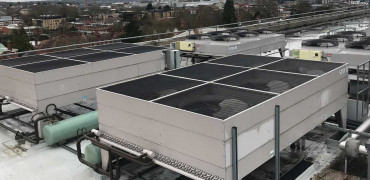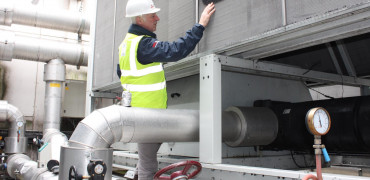In this article, Graham Martin points out the early signs of chiller problems and highlight the importance of good service and maintenance to ensure optimal life-long chiller performance.
There are increasing demands placed on today’s commercial buildings. Offices must be increasingly flexible as working patterns change; indoor environments must support healthy, productive occupants; and building managers and owners face an increasing array of regulations on energy use.
As a result, when important equipment like a chiller stops operating as it should, that can cause unwanted extra stress for the FM team.
Chillers are vital for heating and cooling provision in many commercial buildings which means that when they go wrong, the effects are soon noticeable.
So, it’s good to be aware of performance issues that might indicate problems ahead. I’ve outlined a few early signs that might indicate a chiller that’s not at peak performance:
This is especially important if your building closed during the last two years
Your chillers are suddenly less reliable:
Had years of problem-free operation, but now you’re seeing a build-up of niggling issues?
A recent series of glitches may indicate that it’s time to take a closer look to find what’s behind this downturn in performance.
Your chillers are becoming energy-hungry:
If you’ve been tracking energy use from your chillers (for instance, via the building management system) and noticed that they’re using more energy for the same performance, the chances are that something’s not right.
Chillers can be big energy users, so it’s vital to ensure that they’re as efficient as possible over their whole lifetimes.
Indoor temperatures are not stable:
Complaints from building occupants that they’re experiencing ‘hot spots’ as the weather warms up could be an early indication that chiller performance is falling away.
This could be the result of changes within the building (moving partition walls or increased occupancy in certain areas for example), but it would be wise to ensure that the chiller is still performing optimally.
Your chillers have been standing idle:
If your building closed during the last 18 months to two years, then it’s likely that your chiller has been shut off or running at minimal levels during that time.
While that might not seem like a problem, it can be an excellent idea to double check performance and re-start it correctly.
Your chillers are ageing:
Chillers generally have a long-life, but there are limits to how long it will last.
This is particularly true if you’ve been carrying out the bare minimum of maintenance.
It might be time to let the experts take a look and perhaps give it a new lease of life.
A simple answer
There are of course any number of reasons that a chiller might not perform at its best. However, in my long experience, the main cause of problems with chillers is poor maintenance.
Chillers benefit from good maintenance practice – and they will give excellent service for many years if properly looked after. At Mitsubishi Electric Service and Maintenance, we focus on building long-term solutions for our clients. Planned preventative maintenance (PPM) is the ideal approach. In our view, it costs more to fix a fault than it does to anticipate and prevent it happening to extend the life of an asset.
New technology supports this approach, enabling remote monitoring of chillers by a team of experts. With constant monitoring of performance and energy use, it’s possible to spot any fall-off in performance - and to identify the source of the problem. Not only does this mean building occupants are kept comfortable and safe, but also energy consumption is always well-managed.
With a PPM approach, backed by remote monitoring technology, there’s no need for chiller performance to be anything less than optimal for many years.
Graham Martin is Business Development Manager



